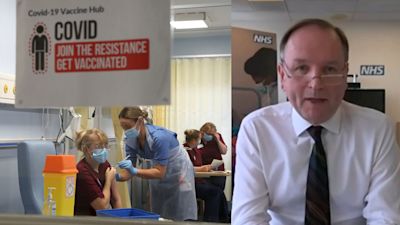'Possible' Covid will become 'much more treatable' in near future, says NHS boss

Covid-19 could become a "much more treatable disease" over the next six to 18 months, the boss of NHS England has said.
Sir Simon Stevens told the Health and Social Care Committee: "I think it is possible that over the course of the next six to 18 months coronavirus also becomes a much more treatable disease with antivirals and other therapies, which alongside the vaccination programme, holds out the hope of a return to a much more normal future."
The chief executive said many in the NHS were "hopeful" of such an improvement, as he warned the country's current scenario with coronavirus was "very serious".
Sir Simon was speaking as the UK neared 100,000 reported Covid-19 deaths.
ITV News Correspondent Chloe Keedy analyses what Sir Simon said
Sir Simon also revealed that there are now 33,000 Covid-positive patients in hospitals across the country, adding this is "stretching the system".
The number of people requiring hospitalisation for the virus has stood at about that level for the past fortnight, he said, and was a “very sharp acceleration” since Christmas - when around 18,000 coronavirus patients were in hospital.
He told the Health and Social Care Committee: "Everybody is getting intensive care and ventilators who clinicians think would benefit, but let’s not disguise the fact that this is obviously stretching the system in an extreme way."
On the prospect of more treatments, he added: "I think a lot of us in the health service are increasingly hopeful that the second half of the year and beyond we will also see more therapeutics and more treatments for coronavirus."
Quizzed on the vaccine roll out across the UK - with 6,573,570 first doses already rolled out - Sir Simon said vaccinating those aged 65 and over will make a “big impact” on hospital bed usage.
Currently the government is targeting the over-70s and the clinically extremely vulnerable, with the over-80s the priority.
"About a quarter of hospital admissions for Covid are for people aged under 55, and about half of inpatient bed days for coronavirus patients, relates to patients under the age of 65," Sir Simon told MPs.
He said deaths were "highly concentrated" in the older age groups, but added: "By the time you are vaccinating people, 65, 70, 75, you’re beginning to make a big impact on the hospital bed usage, not just the avoidable deaths."
But the NHS boss said the priority order for vaccinations could be subject to change, with teachers, police and people with learning disabilities considered for the next round.
"There will be a legitimate discussion in my view that the Joint Committee on Vaccination and Immunisation will have to advise on as to whether or not there are certain other groups who should receive that priority.
"People with learning disabilities and autism, certain key public service workers, teachers, the police, they will have to be factored in that post-February 15 prioritisation decision."
Sir Simon said reducing the number of hospital beds occupied by Covid-19 patients was not "the only consideration" policymakers would take into account when deciding the vaccination priority list.
"Fundamentally, the most important thing is to get the overall infection rate down, this is not principally about pressure on the NHS, this is principally about reducing the avoidable death rate," he added.